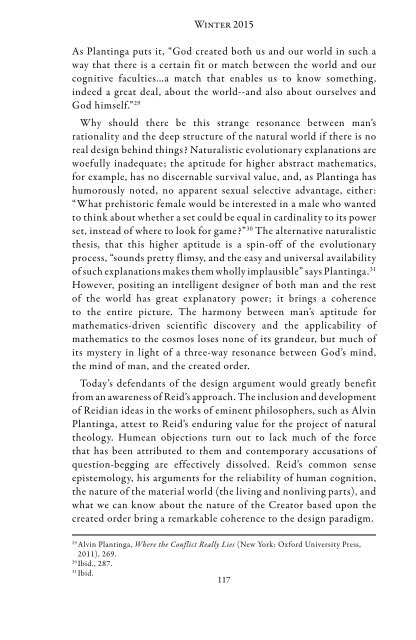THE CITY
h6c7p5d
h6c7p5d
Create successful ePaper yourself
Turn your PDF publications into a flip-book with our unique Google optimized e-Paper software.
Winter 2015<br />
As Plantinga puts it, “God created both us and our world in such a<br />
way that there is a certain fit or match between the world and our<br />
cognitive faculties…a match that enables us to know something,<br />
indeed a great deal, about the world--and also about ourselves and<br />
God himself.” 29<br />
Why should there be this strange resonance between man’s<br />
rationality and the deep structure of the natural world if there is no<br />
real design behind things? Naturalistic evolutionary explanations are<br />
woefully inadequate; the aptitude for higher abstract mathematics,<br />
for example, has no discernable survival value, and, as Plantinga has<br />
humorously noted, no apparent sexual selective advantage, either:<br />
“What prehistoric female would be interested in a male who wanted<br />
to think about whether a set could be equal in cardinality to its power<br />
set, instead of where to look for game?” 30 The alternative naturalistic<br />
thesis, that this higher aptitude is a spin-off of the evolutionary<br />
process, “sounds pretty flimsy, and the easy and universal availability<br />
of such explanations makes them wholly implausible” says Plantinga. 31<br />
However, positing an intelligent designer of both man and the rest<br />
of the world has great explanatory power; it brings a coherence<br />
to the entire picture. The harmony between man’s aptitude for<br />
mathematics-driven scientific discovery and the applicability of<br />
mathematics to the cosmos loses none of its grandeur, but much of<br />
its mystery in light of a three-way resonance between God’s mind,<br />
the mind of man, and the created order.<br />
Today’s defendants of the design argument would greatly benefit<br />
from an awareness of Reid’s approach. The inclusion and development<br />
of Reidian ideas in the works of eminent philosophers, such as Alvin<br />
Plantinga, attest to Reid’s enduring value for the project of natural<br />
theology. Humean objections turn out to lack much of the force<br />
that has been attributed to them and contemporary accusations of<br />
question-begging are effectively dissolved. Reid’s common sense<br />
epistemology, his arguments for the reliability of human cognition,<br />
the nature of the material world (the living and nonliving parts), and<br />
what we can know about the nature of the Creator based upon the<br />
created order bring a remarkable coherence to the design paradigm.<br />
29<br />
Alvin Plantinga, Where the Conflict Really Lies (New York: Oxford University Press,<br />
2011), 269.<br />
30<br />
Ibid., 287.<br />
31<br />
Ibid.<br />
117


